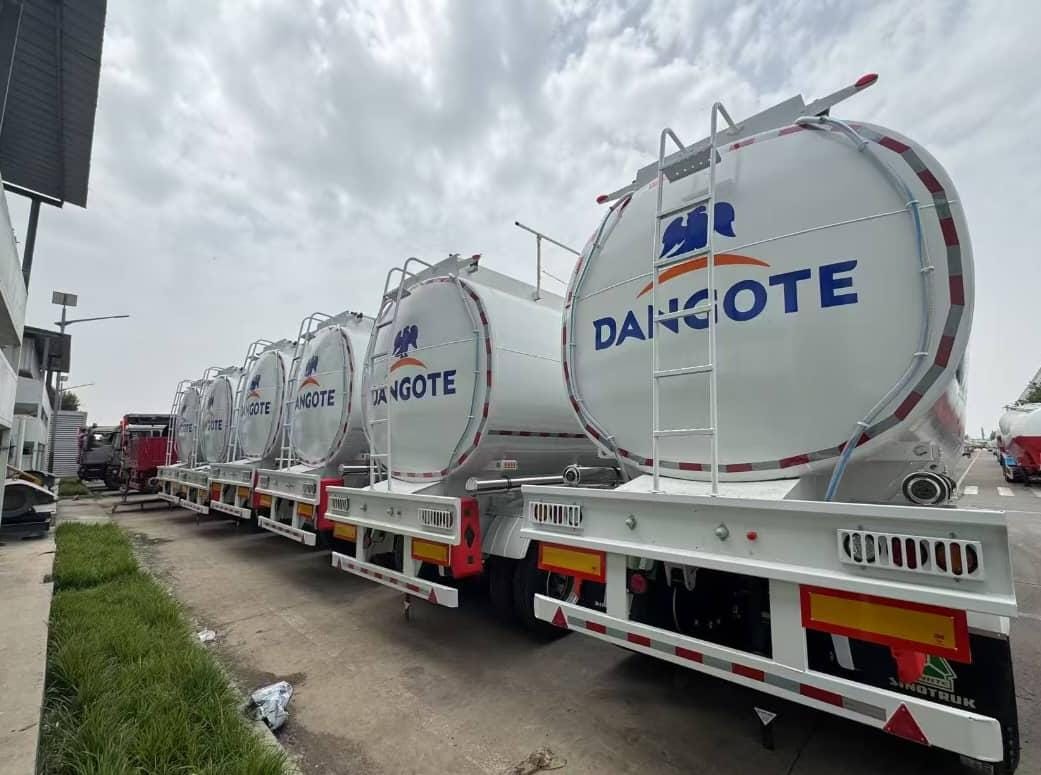PRESS RELEASE
Dangote Petroleum Refinery will effective 15th August 2025 launch a national initiative to transform Nigeria’s fuel distribution architecture, to make available Premium Motor Spirit (PMS) and diesel to marketers, petrol dealers, manufacturers, telecoms firms, aviation, and other large users across the country, with free logistics.
“To ensure smooth take-off of this scheme, Dangote Refinery has invested in the procurement of 4,000 brand-new Compressed Natural Gas (CNG)-powered tankers,” the Dangote Industries limited (DIL) said in a statement on 15 June 2025. “This phase of the programme will continue over an extended time-frame.”
According to the statement: “Under this initiative, all petrol stations purchasing PMS and diesel from the Dangote Petroleum Refinery will benefit from this enhanced logistics support. Key sectors such as manufacturing, telecommunications, and others will also gain from this transformative initiative, as reduced fuel costs will contribute to lower production costs, reduced inflation, and foster economic growth. Players in these key sectors and others can purchase directly from the Dangote Petroleum Refinery.”
It explained that the refinery “is also investing in Compressed Natural Gas (CNG) stations, commonly referred to as daughter booster stations, supported by a fleet of over 100 CNG tankers across the country to ensure seamless product distribution.”
“This strategic programme is part of our broader commitment to eliminating logistics costs, enhancing energy efficiency, promoting sustainability and supporting Nigeria’s economic development. It affirms our dedication to improving the availability and affordability of fuel, in support of broader efforts to strengthen the economy and improve the well-being of all Nigerians,” the the Dangote Group added.
Furthermore, “the refinery will offer a credit facility to those purchasing a minimum of 500,000 litres – allowing them to obtain an additional 500,000 litres on credit for two weeks, under bank guarantee.”
“This pioneering effort marks a major milestone in our vision to revolutionise Nigeria’s energy sector,” the statement said, adding: “Dangote Refinery is dedicated to ensuring that no place is left behind. Our goal is to provide equitable access to affordable fuel for all Nigerians, regardless of location, making energy more accessible and sustainable for everyone, wherever they may be.”
The initiative, which the statement said: “is in line with the Renewed Hope Agenda of His Excellency, President Bola Ahmed Tinubu, reflecting our shared commitment to economic progress, stability, and inclusive development,” is “expected to revitalise previously inactive petrol stations, thereby driving job creation, stimulating small and medium-sized enterprises (SMEs), increasing government revenue, improving fuel access in rural and underserved communities, and strengthening investor confidence in Nigeria’s downstream petroleum sector.”
The Group thanked “the Federal Government for its continued support, especially through the Naira-for-Crude scheme, which has helped stabilise fuel supply amid global price volatility,” adding: “It marks a major revolution in the midstream and downstream sectors and stands as a key example of President Bola Tinubu’s bold and reformative economic policies.”
The statement urged “marketers, petrol dealers, manufacturers, telecom companies, and all key stakeholders to embrace this landmark initiative,” with the registration process, including a 60-day Know Your Customer (KYC) verification starting 16 June through 15 August 2025.
The DIL, owned by Africa’s richest man Alhaji Aliko Dangote, has become a major player in Nigeria’s energy sector, through the 20US$ billion refinery, which came on stream last year with 650,000 litre-per-day production capacity, enough to meet Nigeria’s domestic consumption and surplus for export.
The Dangote Refinery, the World’s largest single-train refinery, is one of a score of private refineries licensed by the Nigerian government to end the embarrassing development of an oil-producing nation relying on imported petroleum products after four state-owned refineries were run aground resulting in incessant hardship and domestic shortages.
Private sector involvement has not ended the perennial scandals of opaque and phantom dealings characterising Africa’s most populous oil industry. These include oil tankers reportedly disappearing on the high seas and deal-making by marketers/suppliers, some accused of engaging in round-tripping or rotation of empty oil tanks and getting paid as if they brought in products, with regulators looking the other way.
![]()








